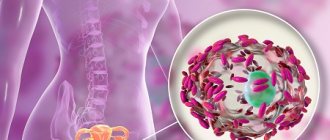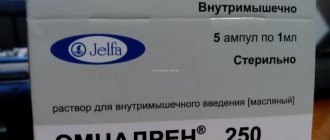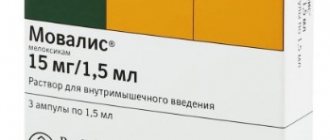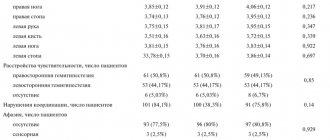Compound
| Oral solution | 1 ml |
| active substance: | |
| Echinacea purple herb juice dried* | 46.5 mg |
| ascorbic acid** | 20 mg |
| excipients: potassium sorbate - 2 mg; disodium edetate - 0.5 mg; orange flavor - 1.5 mg; maltitol (liquid) – 650 mg; purified water - 486.1 mg; sodium hydroxide - 1.6 mg | |
| * dried Echinacea purpurea juice is obtained from freshly harvested Echinacea purpurea L. (Moench), on average the ratio of Echinacea juice: dried Echinacea juice is 18–25: 1; ratio freshly picked herb : dried juice - 30–60 : 1 | |
| **ascorbic acid is added with an excess of 10% for the purpose of stabilization |
general information
Registration number
P N013458/01
Tradename
Immunal®
Dosage form
Oral solution
Description
Transparent to cloudy brown solution. During storage, the formation of flaky sediment is acceptable.
Compound
1 ml of oral solution contains the active substance: Echinacea purpurea (L.) Moench juice - 0.80 ml; excipients: ethanol, sorbitol.
Release form
Oral solution, 50 ml of the drug in a dark glass bottle, 1 bottle complete with a dosage pipette and instructions for medical use in a cardboard box.
Storage conditions
At a temperature not exceeding 25° C. Keep out of the reach of children.
best before date
2 years. Do not use the drug after the expiration date.
Conditions for dispensing from pharmacies
Over the counter.
Manufacturer
Sandoz d.d. Verovškova 57, 1000, Ljubljana, Slovenia
Produced by: Lek d.d. Verovškova 57, 1526, Ljubljana, Slovenia
Consumer complaints should be sent to Sandoz CJSC:
125315, Moscow, Leningradsky Prospekt, 72, bldg. 3; Tel. Fax (495) 660-75-10
Directions
special instructions
If side effects occur, you should stop taking Immunal® and consult a doctor. If your condition worsens or a high temperature appears while using the drug, or symptoms of the disease persist for more than 10 days, you should consult your doctor. Immunal® oral solution contains 20% ethanol. The content of absolute ethyl alcohol in the maximum single dose of the drug is 0.38 g, the content of absolute ethyl alcohol in the maximum daily dose of the drug is 1.14 g. During storage, the formation of a flaky sediment consisting of active polysaccharides is acceptable. Shake the bottle thoroughly before use.
Effect on ability to concentrate
When taking the drug in recommended doses, no special precautions are required.
Application
Indications for use
Immunal® is recommended for use to strengthen the immune system in patients with uncomplicated acute infectious diseases, a predisposition to frequent colds, for the prevention of colds and flu, and also as an adjuvant drug for long-term antibiotic therapy of chronic infectious diseases accompanied by decreased immunity.
Contraindications
- hypersensitivity to the components of the drug and plants of the Asteraceae family;
- progressive systemic and autoimmune diseases (such as tuberculosis, sarcoidosis, collagenosis, multiple sclerosis);
- immunodeficiency (AIDS or HIV infection) and immunosuppression (for example, cytostatic antitumor therapy; history of organ or bone marrow transplantation);
- blood diseases (agranulocytosis, leukemia);
- allergic diseases (urticaria, atopic dermatitis, bronchial asthma);
- age up to 12 years (insufficient data on effectiveness);
- pregnancy and breastfeeding period.
Carefully
Liver diseases, alcoholism, traumatic brain injury, brain diseases, children over 12 years of age (the drug contains ethyl alcohol).
Use during pregnancy and breastfeeding
Data on the use of Echinacea during pregnancy and during breastfeeding are limited, therefore the use of the drug during pregnancy and during breastfeeding is contraindicated.
Directions for use and doses
Use internally regardless of meals. Before taking, the required amount of the drug must be measured using the supplied graduated dosage syringe and diluted in a small amount of water. Adults and adolescents over 12 years of age, take 2.5 ml of oral solution 3 times a day. For prevention during seasonal diseases and treatment of colds, it is recommended to take the drug continuously for 10 days. Repeated courses are possible on the recommendation of a doctor after a 14-day break. For treatment, the drug should be started at the first sign of a cold.
Side effect
According to the World Health Organization (WHO), adverse effects are classified according to their frequency as follows: very common (≥1/10), common (≥1/100 to Blood and lymphatic system disorders frequency unknown: leukopenia (with continuous use for more than 8 weeks).Immune system disorders, frequency unknown: hypersensitivity reactions (skin rash, itching), angioedema, Quincke's edema, Stevens-Johnson syndrome, anaphylactic shock. Echinacea may provoke allergic reactions in patients with atopy. Also the relationship between the occurrence of adverse events and autoimmune diseases has been reported (diffuse encephalitis, erythema nodosum, immunothrombocytopenia, Evans syndrome, Sjögren's syndrome with renal tubular dysfunction).Disorders from the cardiovascular system, frequency unknown: dizziness, decreased blood pressure. Disorders from the respiratory system and chest organs, the frequency is unknown: bronchospasm with obstruction and attacks of bronchial asthma as manifestations of hypersensitivity reactions. If side effects occur, you should stop taking the drug and consult your doctor.
Overdose
Symptoms of intoxication due to an overdose of the drug were not noted.
Interaction with other drugs
No studies have been conducted on the interaction of Echinacea purpurea preparations with other drugs. Immunal® oral solution contains alcohol, and therefore the drug may enhance or change the effect of other medications. Clinically significant interactions have been observed with simultaneous use of ethyl alcohol, even in small quantities, with one of the following five cephalosporin derivatives: cefamandole, cefotetan, cefmenoxime, cefoperazone and moxalactam. The patient's response was characterized by facial flushing, nausea, sweating, headache and rapid heartbeat. In this regard, Immunal® oral solution should not be used when treating a patient with these antibiotics. Taking Immunal® in the form of an oral solution is permitted only three days after the end of the course of treatment with the above cephalosporin derivatives.
The effectiveness of Immunal as a nonspecific immunostimulant
AND
The immune system is an extremely complex multicomponent system, highly sensitive to the influence of various factors. Changing environmental conditions, incl. anthropogenic ones, to which a person does not have time or cannot adapt, lead to a weakening of the immune response and an increase in immune-dependent pathology, as well as to the chronicization of diseases. At the same time, the resistance of pathogenic factors to traditional drugs is increasing.
The need to use stimulants of nonspecific defense factors, previously called nonspecific immunity factors, arises quite often. A similar situation occurs, for example, in people with frequent acute respiratory infections (ARVI). The repeated occurrence of acute respiratory viral infections of the same origin during life is due to the antigenic insufficiency of the main causative agents of the disease (including the influenza virus) for the formation of stable specific immunity. Means that stimulate nonspecific defense include, among other things, some natural substances of plant origin. The advantages of this category of drugs are their availability, safety (they are over-the-counter drugs), and the possibility of oral administration.
Echinacea purpurea ) is widely used for the purpose of immunostimulation, including by general practitioners.
). According to the literature, the main groups of biologically active substances of Echinacea purpurea are identified:
– Alkamids
. This group of biologically active substances has been shown (2–5) to have a stimulating effect on the phagocytic activity of granulocytes, as well as an anti-inflammatory effect due to the inhibition of eicosanoid production.
– Arabinogalactones
. An interferon-inducing effect was found in this group of substances.
– Glucoproteins
. Their weak proliferative effect on B lymphocytes was discovered.
The Scientific Advisory Department of the Institute of Immunology conducted a clinical evaluation of the effectiveness of the prophylactic use of echinacea in patients with diseases believed to be based on immunosuppression. Immunal (freshly squeezed juice of a flowering plant with the addition of a preservative - 20% alcohol) produced by the pharmaceutical company Lek (Slovenia) was used as an echinacea preparation. Immunal is the most famous and widely used drug with proven experience of effective use. Immunal, unlike other preparations from echinacea, is the juice of freshly harvested plants, and not a tincture or extract, therefore Immunal provides a more complete composition and a high content of active substances.
The following groups of patients were selected (Table 1):
1 – with frequent acute respiratory diseases (10 people). This group included patients with annual manifestations of ARVI at least 4 times during the autumn-winter period (September-March) for at least the last 2 years;
2 – with recurrent herpes ( Herpes simplex
nasal, labial). Total 10 people; 4 had concomitant genital herpes. The frequency of relapses of herpes is at least 4 times a year over the last 2 years;
3 – with chronic bronchitis (8 people);
4 – with chronic tonsillitis. Total 10 people; three patients had concomitant chronic pharyngitis. For all patients in the group, the main problem was frequent exacerbations of tonsillitis (more than 5 times a year), but not acute respiratory viral infections (the frequency of acute respiratory viral infections is up to 3 times in September–March).
The age of patients of all groups is from 25 to 55 years.
The following regimen for using Immunal was used: 20 drops 3 times a day for 4 weeks, then a three-week break, after which a repeated four-week course at the same dosage. When ARVI occurred (groups 1–4), patients followed a home regimen and received standard symptomatic treatment (warm drinks, home remedies, and, if necessary, antipyretic medications, vasoconstrictor nasal drops, gargling with soda solution). The regimen for using Immunal did not change. In case of relapse of herpes (group 2), acyclovir was used orally according to the standard method for 5–7 days. In case of relapse of bronchitis in group 3, antibiotics and ambroxol were used. In group 4, individual prescriptions from an ENT doctor were used (local therapy with various antiseptic and anti-inflammatory drugs, and, if necessary, oral antibiotics).
As a control, the following were formed accordingly: 1A group (8 people with inclusion criteria similar to group 1), 2A group (5 people; all had only labial and/or nasal herpes), 3A group (5 people), 4A group (8 people with criteria similar to group 4). Patients in the control groups upon relapse of the disease received therapy similar to the main groups, with the exception of Immunal.
Observations were carried out from October to March. Immunal was used in October–December according to the above scheme.
The effectiveness of the treatment was assessed in all groups according to the following criteria:
– frequency of cases of relevant diseases (number of cases during the observed period),
– patient’s subjective assessment of the effectiveness of the therapy in points (1 – excellent – there were no manifestations of the disease; 2 – good – health improved significantly, the disease manifested itself less frequently than in the previous 2 years; 3 – satisfactory – health improved, the disease was subjectively easier, although the frequency of the disease has not decreased (but has not increased); 4 – unsatisfactory – no effect or worsening).
The study aimed to clinically evaluate the preventive effectiveness of Immunal; laboratory indicators of the functioning of the immune system were not studied.
As a result, a decrease in the frequency of acute respiratory viral infections in patients of group 1 was revealed compared to patients in group 1A by an average of 50%. At the same time, 3 patients of group 1 were ill as often as in previous years. Noteworthy is the fact that 4 of the remaining 7 patients in this group had signs of autonomic dysfunction. In addition, the diseases in these 4 patients were shifted towards the end of the observation period, i.e. during the period without taking Immunal. In group 1A, the incidence of ARVI did not decrease.
In patients of groups 2 and 2A, no significant differences were found in the course of herpetic infection. A slight decrease in the frequency of relapses of herpes in several patients of group 2 was apparently associated with a slightly lower frequency of “cold” morbidity during the observation period. The recurrence rate of genital herpes has not decreased.
No significant changes were found in group 3 when compared with group 3A and previous years. During the observed period, there were the usual 1–2 exacerbations of bronchitis, in terms of timing “tied” to ARVI.
In group 4, there was a significant decrease in the frequency and severity of exacerbations of chronic tonsillitis compared to previous years. However, similar results (to a slightly lesser extent) were recorded in group 4A. Probably, such dynamics of the disease can be explained by adequate observation and treatment by an ENT doctor as part of the study. Patients' assessment of the effectiveness of treatment is shown in Table 2.
Of particular interest is the use of Immunal in children and adolescents. Immunal is the only drug based on echinacea, the effectiveness and safety of which has been proven by clinical studies conducted at the Influenza Research Institute of the Russian Academy of Medical Sciences, and approved for use in children starting from 1 year. Recommended doses for children aged 1 to 6 years are a single dose of 5–10 drops, and for children aged 6–12 years – 10–15 drops. For preventive purposes, it is useful to take Immunal three times a year. The duration of the course is one to one and a half months. If a child is already suffering from ARVI or influenza, the use of Immunal promotes a speedy recovery, and the earlier the drug is started, the greater its effectiveness. Taking Immunal reduces the severity of symptoms of the disease and shortens the duration of the disease. The medicine has a pleasant herbal taste and is dosed using a special measuring pipette.
In conclusion, we can say that the study showed the effectiveness of Immunal as a means of reducing the incidence of acute respiratory viral infections. To clarify the mechanism of this effect, additional research is required, in particular, research on immunity parameters. There was no significant effect on the course of herpetic infection and chronic bronchitis in this study, which could be due to the limited number of patients and the unspecified nature and degree of immunosuppression, as well as short-term use of Immunal. The role of Immunal in improving patients with chronic tonsillitis also requires additional research.
Thus, Immunal can be recommended as a prophylactic agent in patients with frequent respiratory viral diseases during the seasonal rise in incidence.
In the future, it is advisable to conduct clinical and laboratory clarification of the effect of various doses and regimens of using Immunal in the treatment of patients with different degrees of severity of immunosuppression in chronic recurrent infections. Literature:
1. V.M. Manko, R.V. Petrov, R.M. Khaitov. Immunomodulation: history, development trends, current state and prospects. Immunology. – 2002. – T.23, No. 3. – P. 132–138.
2. Wagner H et al. Zeitschrift fur Phytotherapie. – 1987. – 8. – 125–126. – Part 4, pages 119–120.
3. Wagner H et al. Planta Medica. – 1985. – 139–144. – Part 4, pages 121–126.
4. Hagers Handbuch der pharmazeutischen Praxis Band 5, Springer Verlag Berlin. – 1993. – 17–34. – Part 4, pages 317–334.
5. Stotzem CD, Hungerland U. Medical Science Research. – 1992. – 20. – 719–720. – Part 4, pages 335–336.
Pharmacokinetics
Pharmacotherapeutic group
Immunostimulating agent of plant origin. ATX code: L03AX
Pharmacological properties
Immunal® is an immunostimulating drug made from medicinal plant materials.
Echinacea purpurea (L.) Moench) contains active substances that enhance the body's natural defenses and act as immune stimulants. By increasing the number of leukocytes (granulocytes) and activating phagocytosis, the active ingredients of the drug suppress the proliferation of microorganisms in the human body and contribute to the destruction of pathogenic bacteria. In addition, the antiviral effect of the herb Echinacea purpurea against pathogens of influenza and herpes has been established.



